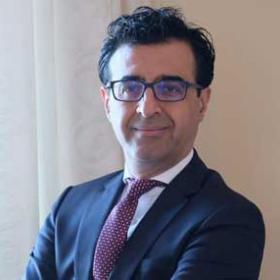
Kawa Hassan Talks at IRIS Webinar on Iraq-EU Relations
On December 1, EWI’s Vice President of the Middle East and North Africa Program, and Director Brussels Office, Kawa Hassan, gave a presentation during an online seminar hosted by the Institute of Regional and International Studies (IRIS) at the American University of Iraq, Sulaimani (AUIS) entitled “Iraq-EU Relations: Stabilization, Reconstruction and Security.”
Other speakers included EU Ambassador to Iraq, Martin Huth; Netherlands Ambassador to Iraq, Michel Rentenaar; Middle East Institute Non-Resident Scholar, Hafsa Halawa; and MENA Special Advisor at the Center for Humanitarian Dialogue, Maria Fantappie, who moderated the discussion.
Click here to watch the full webinar. Hassan’s comments occur during the time interval 35:49-45:42 and begin again at 1:09:01. Click here to read an Arabic translation of Hassan's comments. Read excerpts from his comments, below.
I will talk about one, specific dimension of the EU's Iraq strategy, namely supporting Iraq’s good relations with its neighbors. On January twenty second 2018, almost three years ago, the EU adopted a new Iraq strategy. One of the objectives of this strategy is to support regional dialogue, help Iraq to foster diplomatic engagement with neighboring countries, and encourage Iraq’s neighbors to play a constructive role, to sustain and increase their support to Iraq. Three years on, this strategic objective is more than ever relevant for Iraq and the EU, but it may need to be updated and operationalized to reflect internal, Iraqi and external, regional developments.
Given systemic corruption and mismanagement, coronavirus pandemic and low oil prices, post-2003 Iraq is on the verge of economic collapse. Without real reforms, Iraq is on the brink of the transition from a fragile state to a failed state. This transformation, should it occur, will be disastrous for Iraq and its neighborhood, and will negatively impact the interests of the EU and its member states as it will undoubtedly unleash waves of migration in the region and towards the EU, will provide ISIS with a new lease of life, and further deteriorate regional security.
In light of these developments, the EU is uniquely well positioned to help Iraq become more independent from external actors especially Iran and the US by developing balanced, win-win political and economic relations with its neighbors. One of the key takeaways of our joint project at EastWest Institute with our partner organization CARPO entitled “Iraq and Its Neighbors,” and supported by EEAS is that across the board in Iraq and the region the EU is considered and perceived as a neutral player without a negative agenda or problematic track record. In the current polarized and fragmented middle east, this neutrality is a unique, strategic asset that assists the EU to pursue its strategic goal of fostering bilateral and regional dialogue focused on the future of Iraq as an independent state.
In the 1980s during the Iraq Iran war, Saddam Hussein portrayed Iraq as a strategic buffer against Iran, or in Saddam’s terminology Iraq was “Albawaba Alsharqya” or the Eastern Gate [against Iran]. Since 2003, Iraq has become a strategic battleground for proxy and direct conflicts between Iran and the US. History has shown that both regional roles have proved to be disastrous for Iraq and beyond.
Therefore, there is a need for the development of a third way. The EU can help Iraq become a prosperous, positive actor, a meeting, neutral point between and for regional rivals, or what we can call a positive, strategic balancer as opposed to a strategic playground between Iran and the US, and a strategic buffer against Iran.
To translate this analytical concept into a practical policy, the EU can implement a two-prong strategy. Internally, It can engage and encourage key, powerful Iraqi players on official and unofficial levels to achieve a minimum internal consensus that should aim at supporting Iraqi government’s goal of developing balanced relations with neighboring countries in particular Iran and Saudi Arabia. Externally, the EU can engage the key Iraqi neighbors to develop balanced economic and political relations with Iraq, instead of simply seeing Iraq as a market for their products and hence correct the current imbalance trade ties with Iraq, and secondly to stop using Iraq as a theater to settle scores with their rivals.

